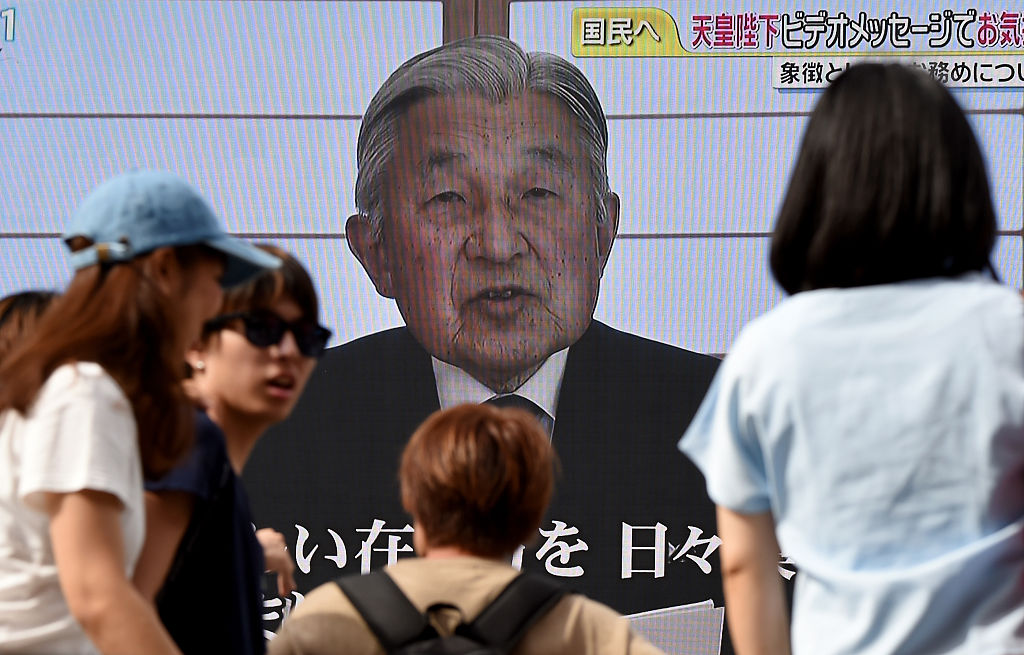Japan's emperor hints at abdication in rare televised speech


A free daily email with the biggest news stories of the day – and the best features from TheWeek.com
You are now subscribed
Your newsletter sign-up was successful
On Monday, Japan's Emperor Akihito made his second-ever televised address, gently nudging Japan's parliament to act so he can step down and pass the throne to his eldest son, Crown Prince Naruhito, 56. Akihito, 82 and in poor health, has been emperor since his father, Emperor Hirohito, died in 1989. It is widely known that he wants to abdicate, but he had to approach the subject indirectly, because Japan's post-World War II constitution doesn't allow the emperor to engage in politics.
"I am concerned that it will become more and more difficult for me to fulfill my duties as a symbolic emperor," Akihito said in his prerecorded, 10-minute message. If he gets too infirm to fulfill his obligations now, "a regency may be established to act in the place of the emperor," he said, but "even in such cases, however, it does not change the fact that the emperor continues to be the emperor till the end of his life." Prime Minister Shinzo Abe, whose conservative government does not share the Japanese public's strong support for letting the emperor retire, said Monday that "considering His Majesty's age, the burden of his official duties, and his anxieties, we must think carefully about what can be done."
Japan's Chrysanthemum Throne is the world's oldest hereditary monarchy, dating back nearly 2,700 years, The New York Times reports, and while "historically, it was extremely common for emperors to abdicate," according to Takeshi Hara, an expert on Japan's imperial family, it became impossible in the 19th century, when Japanese leaders created a cult of emperor worship. That lasted until Hirohito declared after World War II that he was not a god. You can read Emperor Akihito's entire speech at BBC News.
The Week
Escape your echo chamber. Get the facts behind the news, plus analysis from multiple perspectives.

Sign up for The Week's Free Newsletters
From our morning news briefing to a weekly Good News Newsletter, get the best of The Week delivered directly to your inbox.
From our morning news briefing to a weekly Good News Newsletter, get the best of The Week delivered directly to your inbox.
A free daily email with the biggest news stories of the day – and the best features from TheWeek.com
Peter has worked as a news and culture writer and editor at The Week since the site's launch in 2008. He covers politics, world affairs, religion and cultural currents. His journalism career began as a copy editor at a financial newswire and has included editorial positions at The New York Times Magazine, Facts on File, and Oregon State University.
-
 The Week Unwrapped: Do the Freemasons have too much sway in the police force?
The Week Unwrapped: Do the Freemasons have too much sway in the police force?Podcast Plus, what does the growing popularity of prediction markets mean for the future? And why are UK film and TV workers struggling?
-
 Properties of the week: pretty thatched cottages
Properties of the week: pretty thatched cottagesThe Week Recommends Featuring homes in West Sussex, Dorset and Suffolk
-
 The week’s best photos
The week’s best photosIn Pictures An explosive meal, a carnival of joy, and more
-
 Nobody seems surprised Wagner's Prigozhin died under suspicious circumstances
Nobody seems surprised Wagner's Prigozhin died under suspicious circumstancesSpeed Read
-
 Western mountain climbers allegedly left Pakistani porter to die on K2
Western mountain climbers allegedly left Pakistani porter to die on K2Speed Read
-
 'Circular saw blades' divide controversial Rio Grande buoys installed by Texas governor
'Circular saw blades' divide controversial Rio Grande buoys installed by Texas governorSpeed Read
-
 Los Angeles city workers stage 1-day walkout over labor conditions
Los Angeles city workers stage 1-day walkout over labor conditionsSpeed Read
-
 Mega Millions jackpot climbs to an estimated $1.55 billion
Mega Millions jackpot climbs to an estimated $1.55 billionSpeed Read
-
 Bangladesh dealing with worst dengue fever outbreak on record
Bangladesh dealing with worst dengue fever outbreak on recordSpeed Read
-
 Glacial outburst flooding in Juneau destroys homes
Glacial outburst flooding in Juneau destroys homesSpeed Read
-
 Scotland seeking 'monster hunters' to search for fabled Loch Ness creature
Scotland seeking 'monster hunters' to search for fabled Loch Ness creatureSpeed Read
